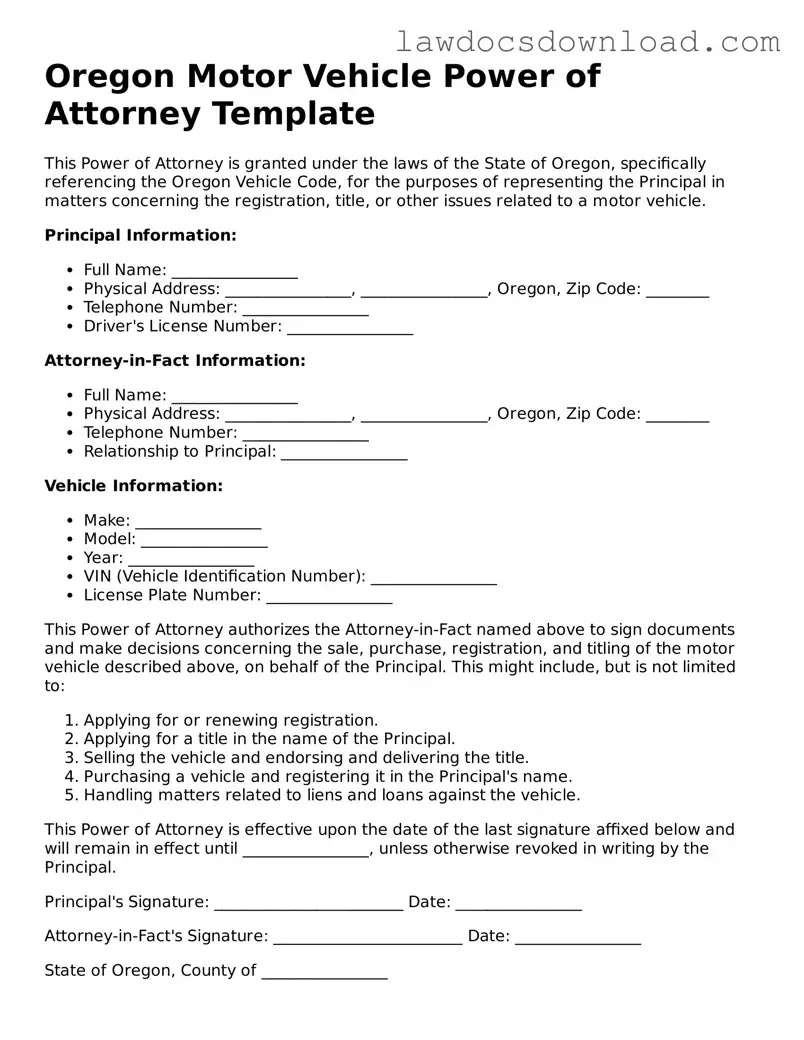Filling out the Oregon Motor Vehicle Power of Attorney (POA) form can be a straightforward process, yet it's not uncommon for individuals to stumble over a few critical steps. This document grants someone else the authority to handle vehicle-related matters on your behalf, so it's important to get it right. Here are ten common mistakes that people often make when completing this form.
A common error is neglecting to provide all necessary personal details. The form requires specific information about both the principal (the person granting the power) and the agent (the person receiving the power). Omitting details like full legal names, addresses, or driver's license numbers can render the document invalid or cause delays.
Another misstep is not specifying the powers being granted with sufficient clarity. The POA can cover a range of duties, from signing documents related to the sale, purchase, or registration of a vehicle, to handling title transfers. Being vague or overly broad about the agent's powers can lead to confusion or misuse of the authority granted.
Choosing an agent without due consideration can be a grave error. The trustworthiness and reliability of the agent are paramount, as they will have significant control over your vehicle affairs. Selecting someone who lacks the necessary integrity or knowledge can lead to mishandled transactions or, worse, fraud.
Many people mistakenly believe that once the form is filled out, nothing more is needed. However, the Oregon Motor Vehicle Power of Attorney form requires notarization to be considered valid. Skipping this step means your POA won't be legally recognized, potentially complicating vehicle transactions.
Incorrectly describing the vehicle or leaving out its identification information such as the VIN (Vehicle Identification Number) is another common pitfall. This detail is crucial for any transactions the agent will carry out since it prevents any mix-up between vehicles and ensures that the POA is being applied to the correct one.
Forgetting to check whether the form complies with current Oregon laws is a mistake easily made but can have significant consequences. Laws governing powers of attorney can change, and using an outdated form or not adhering to new requirements can invalidate the entire document.
Another significant error is failing to specify a duration for the POA. Without a clear termination date or condition, the document may not reflect the principal's intentions, potentially leaving the power of attorney in effect longer than desired.
Many individuals incorrectly assume that a POA for vehicle matters also covers other transactions, such as selling property or making financial decisions. This misunderstanding can lead to inappropriate use of the document, as its scope is limited strictly to motor vehicle-related matters.
Not keeping a copy of the signed and notarized document can be problematic. Should disputes arise or if the document's existence needs to be verified, lacking a copy can complicate situations unnecessarily. It's wise to keep a copy in a safe, accessible place and provide one to the agent as well.
Lastly, a significant oversight is not informing relevant parties, like the Oregon DMV or insurance provider, about the POA. This communication is essential to ensure that future transactions involving the vehicle are processed smoothly and without question regarding the agent's authority.
By being aware of and avoiding these common errors, individuals can ensure their Oregon Motor Vehicle Power of Attorney form is accurate, valid, and effective, laying the groundwork for a smooth management of their vehicle affairs.

